Author: Anukriti Srivastava, Predoctoral Research – PhD Student at Banasthali Vidyapith
The 7th International Conference on Plant Genetics and Genomics, held from [16th February- 17th February 2024], at National Agriculture Science Complex (NASC), New Delhi; India, was organized by the Chandigarh based Glostem Private limited and supported by The Global Plant Council, Federation of Seed Industry of India (FSII), Rasi Seeds, and Springer Nature. This conference brought together a diverse array of scientists, researchers, and experts in the field to delve into the theme of GM Crops and Genome Editing. This report provides a personal perspective on the conference, highlighting key themes, breakthroughs, and the potential impact of genetic modification on agriculture and food security.
The intersection of plant genetics, genomics, and the transformative potential of genetic modification technologies took center stage at the 7th International Conference on Plant Genetics and Genomics. As an active participant in this gathering of scientific minds, this report aims to provide an intimate insight into the overarching themes discussed, the groundbreaking discoveries shared, and the lasting impact of the conference on the field. The different sessions provided the framework of wider discussions on how innovation has been fostered to date and what can be done to direct innovation policies in the future. Indeed, the two days were buzzing with lively discussion and debate – not only during the interactive sessions, but also around the tea tables!
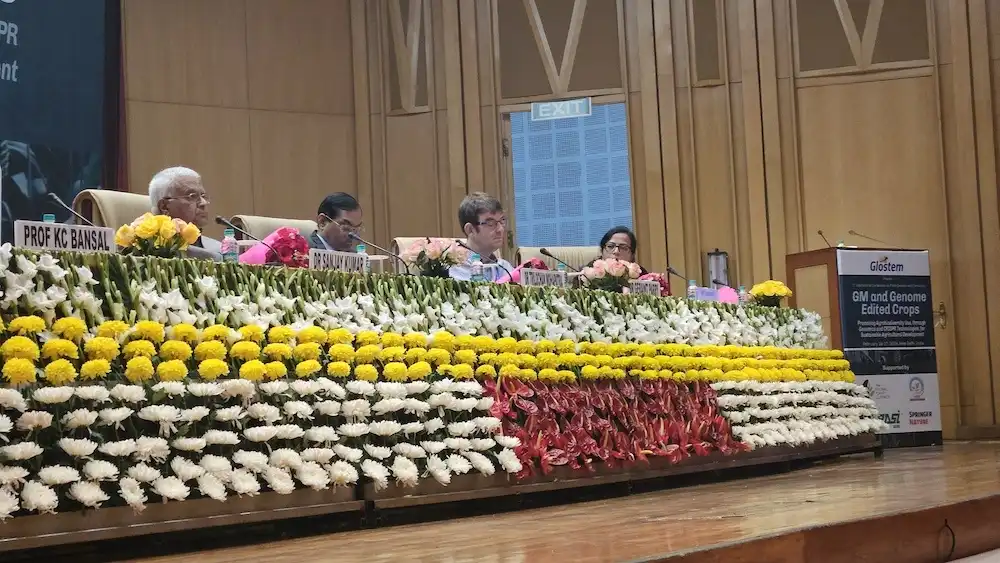
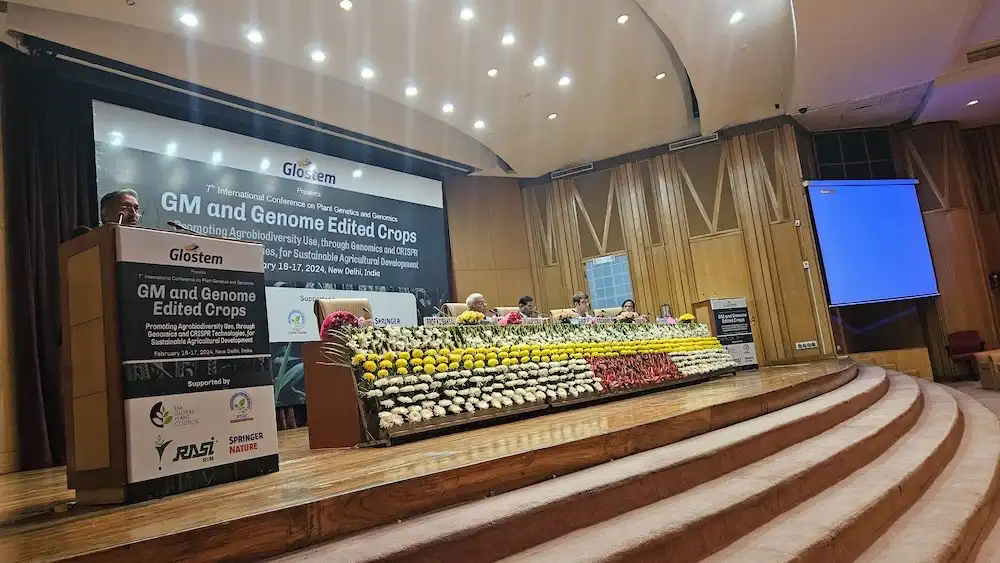
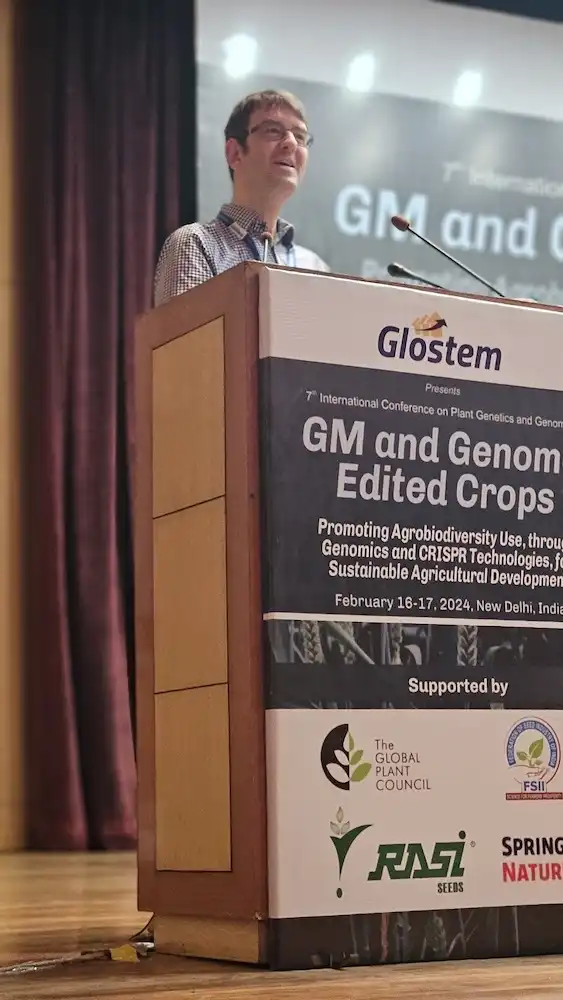
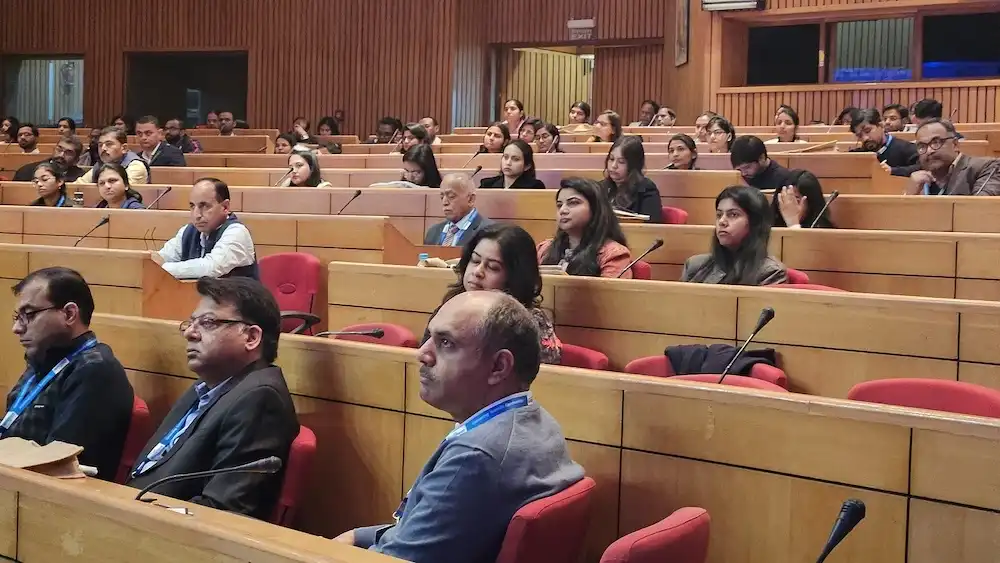
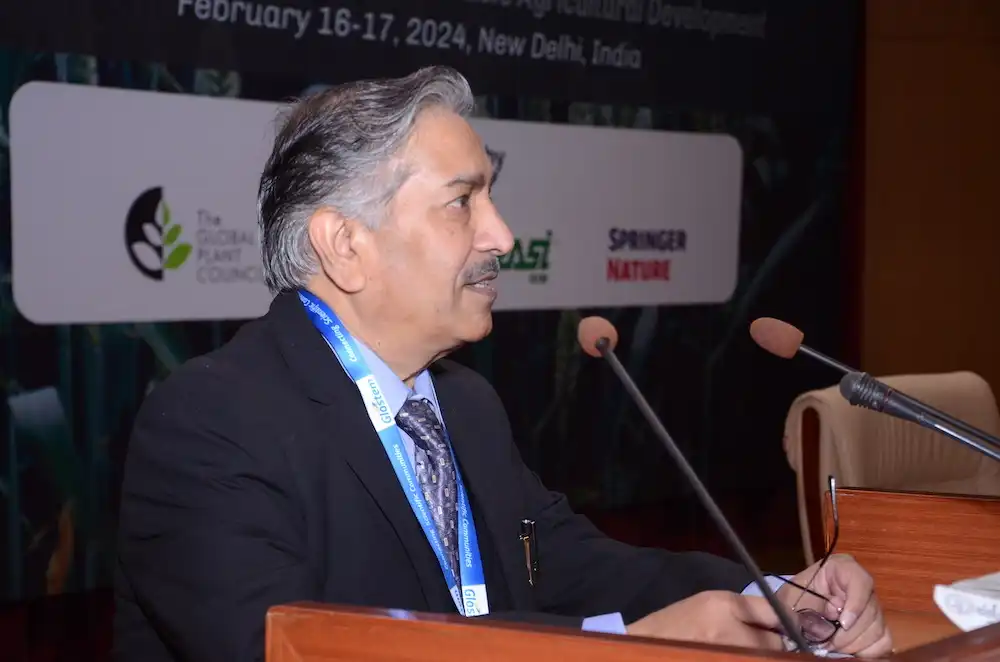

Several key themes were explored such as:
CRISPR-Cas9 and Beyond: Unraveling the Genome Editing Toolbox
The conference featured in-depth sessions on CRISPR-Cas9, a revolutionary genome editing tool. Researchers presented novel applications, methodologies, and ethical considerations surrounding CRISPR technology. Discussions extended to other emerging genome editing techniques, showcasing the dynamic nature of this rapidly evolving field.I found these discussions particularly enlightening, unraveling the intricacies of CRISPR and its potential to revolutionize crop improvement.
GM Crops and Sustainable Agriculture
Sustainable agriculture emerged as a recurrent theme throughout the conference. Presenters elucidated on the role of genetically modified crops in enhancing sustainability by reducing the ecological footprint of agriculture. The integration of traits like drought resistance, pest resilience, and improved nutrient content in crops garnered attention for their potential contribution to global food security.
Ethical and Regulatory Dimensions of Genome Editing
An entire track was dedicated to the ethical considerations and regulatory frameworks surrounding genome editing technologies. Engaging discussions delved into the importance of ethical practices in research, transparency in communication, and the need for robust regulatory frameworks to guide the responsible application of genetic modification in agriculture.
Global Food Security
The conference underscored the pivotal role of GM crops in addressing global food security challenges. Presenters shared insights on how genetically modified crops could contribute to increased agricultural productivity, improved nutritional content, and adaptability to changing climatic conditions, especially in regions facing food shortages.
NOTABLE PRESENTATIONS AND BREAKTHROUGHS
As an active attendee and participant, I was enlightened by the keynote presentation of the President, The Global Plant Council, Canada, Dr Geraint Parry, who delivered an insightful presentation on “Mitigating the impact of Climate Change through Global Support for the Uptake of Plant Genomic Technologies”. He talked about mitigating the impact of climate change through global support for the uptake of plant genomic technologies involves leveraging advanced genetic tools to enhance plant resilience and productivity. By understanding and manipulating plant genomes, scientists can develop climate-smart crops with improved adaptability to changing environmental conditions, increased resistance to pests and diseases, and heightened tolerance to extreme weather events. This approach facilitates sustainable agriculture, ensuring food security in the face of climate challenges.
Additionally, promoting the adoption of these technologies on a global scale fosters international collaboration, fostering a united effort to combat climate change and its detrimental effects on the planet’s ecosystems and agricultural systems. His dedication for advancing sustainable solutions is commendable and his expertise inspires me to actively contribute to a greener future
Dr. KC Bansal, Former Director, of ICAR-NBPGR, New Delhi, India, talked about “Progress and Prospects for Indian Agriculture” in his keynote presentation, where he concluded that the dynamic evolution of India’s agrarian landscape. It delves into transformative advancements, sustainable practices, and emerging opportunities, shaping a resilient future. With a focus on innovation and adaptability, the discourse navigates the challenges and promises of modernizing agriculture for a thriving, food-secure nation.
The other presenters’ contributions at the conference left me with lot of enthusiasm and amazement, showcasing a diverse tapestry of knowledge and innovation. Their presentations seamlessly blended expertise and passion, fostering a collective sense of inspiration and admiration for me. Their talks concluded following areas :
Precision Gene Editing for Crop Improvement
Groundbreaking research showcased precision gene editing as a powerful tool for crop improvement. The ability to modify specific genes responsible for traits such as yield, disease resistance, and nutritional content was demonstrated, indicating a promising future for tailored crop development.
Resistance to Biotic and Abiotic Stress
Several studies presented at the conference demonstrated successful efforts to engineer crops with heightened resistance to pests, diseases, and adverse environmental conditions. These breakthroughs have the potential to reduce the need for chemical pesticides and enhance crop resilience in the face of climate change.
CRISPR Applications in Functional Genomics
Beyond crop improvement, the conference showcased the expanding applications of CRISPR technology in unraveling the complexities of plant functional genomics. From understanding gene functions to dissecting regulatory networks, CRISPR emerged as a versatile tool for advancing our knowledge of plant biology.
Personal Reflection
Participating and attending the 7th International Conference on Plant Genetics and Genomics was a transformative experience that deepened my appreciation for the intricacies of genetic modification in agriculture. The exposure to diverse perspectives, ranging from molecular biologists to agricultural economists, enriched my understanding of the multifaceted challenges and opportunities associated with GM crops and genome editing. The ethical discussions left an indelible mark, urging attendees to reflect on the societal implications of genetic modification. The emphasis on transparency, stakeholder engagement, and the integration of local knowledge in the development and deployment of GM crops underscored the conference’s commitment to responsible innovation.
The conference also served as a platform for networking and collaboration, fostering connections between researchers, industry professionals, and policymakers. The interdisciplinary nature of the discussions catalyzed new ideas and partnerships that have the potential to drive future research initiatives.
The 7th International Conference on Plant Genetics and Genomics provided a platform for researchers and experts to share groundbreaking discoveries and engage in meaningful discussions surrounding GM crops and genome editing. The event showcased the immense potential of genetic modification in addressing global challenges while underscoring the importance of ethical considerations and responsible deployment. As we navigate the future of agriculture, the insights gained from this conference will undoubtedly shape the trajectory of genetic modification technologies. The collaborative spirit, ethical consciousness, and dedication to sustainable practices exhibited at the conference serve as a guiding light for scientists and stakeholders invested in harnessing the potential of GM crops and genome editing to address global challenges and secure a resilient future for agriculture.







